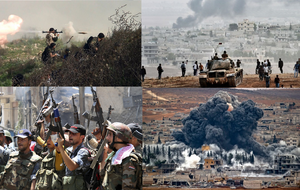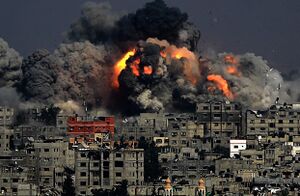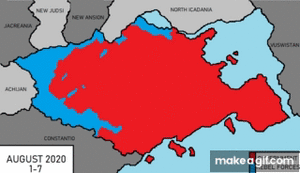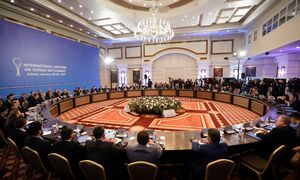Second Syraranto Civil War
| Second Syraranto Civil War | ||||||
|---|---|---|---|---|---|---|
 Clockwise from top-left; B.N.G. fighters attacking Syraranto government forces, fighters aligned with the Syraranto government overlook the city of Urikiban, a bomb explodes in the city of Gurikans, rebel fighters in the city of Tirikan. | ||||||
| ||||||
| Belligerents | ||||||
|
Government Supporters |
Separatist Supporters |
Coalition Forces | ||||
| Commanders and leaders | ||||||
|
|
|
| ||||
| Casualties and losses | ||||||
|
|
| ||||
|
| ||||||
The Syraranto Civil War, more commonly referred to as the Second Syraranto Civil War due to its consideration as a successor to the First Syraranto Civil War of 1956-59, is an ongoing multi-sided civil war in Syraranto fought between the Federal Government forces led by President Kyriakos Tasoulas, along with domestic and foreign allies, and various domestic and foreign forces opposing both the Syraranto government and each other in varying combinations such as the Balgita Nationalist Forces and the Free Syraranto Army.
The unrest in Syraranto began largely with the 2016 Syraranto Revolution protests, which grew out of discontent with the Syraranto government's growing suppression of civil liberties such as the right to gather in protest. Following the election of President Tasoulas in 2017, unrest began to grow in Western Syraranto as many separatist movements began to grow, demanding autonomy from the federal government. On July 29th, 2020, the Balgita Nationalist Forces rebel group detonated a bomb in front of the Syraranto Parliament in Covijo, killing 23 people and injuring dozens more. An intensive investigation with international intelligence aid from the Zamastanian Intelligence Service determined that the B.N.F. had committed the attack in an attempt to kill President Tasoulas, who was unharmed in the attack. Six days later, the President launched a military offensive against "terror organizations and rebel insurgents" in Western Syraranto, effectively escalating to an armed conflict after protests calling for Tasoulas' removal were violently suppressed.
On August 5th, 2020, President Xi Jingyi of Yuan pledged military support to Tasoulas, and dispatched a contingent of the Yuaneze Navy to the Sotoa Sea. On August 7th, the Syraranto military began seiging the city of Tirikan, launching a carpet-bombing campaign largely indiscriminately against the city's inhabitants. Zamastan, Caspia, and Rio Palito among other nations heavily sanctioned the Syraranto government as perceptions of an ethnic cleansing against the Gurriana people in the Western part of the country began to unfold, and Drambenburg began sending relief packages to Tirikan via airdrops. Achijan and North Icadania began supporting and supplying rebel forces as the conflict quickly escalated. By August 31st, Secretary-General Katherine von Wettin announced that the conflict had officially evolved into a civil war, and fighting began to erupt in the country's largest cities like Covijo, Gurikans, and Tabaca.
International organizations in the Coalition of Crown Albatross have criticized virtually all sides involved, including the Syraranto government, the B.N.G., opposition rebel groups, Yuan, and Great Epsilon of severe human rights violations and massacres, as well as numerous instances of chemical weapons attacks by government and Epsilon forces. The conflict has caused a major refugee crisis. Over the course of the conflict, a number of peace initiatives have been launched, but fighting has continued.
Background
Tasoulas government and civil unrest
The Socialist Kyriakos Tasoulas government came to power in 2015 through a emergency parliamentary election following the resignation of Mirakulo Eradon's government after a corruption scandal. The unrest in Syraranto continued largely with the 2016 Syraranto Revolution protests, which grew out of discontent with the Eradon government's growing suppression of civil liberties such as the right to gather in protest. Tasoulas' government remained the dominant political authority in what had been a one-party state until the first multi-party election to the People's Council of Syraranto was held in 2017. On 31 January 2017, Tasoulas implemented a new constitution, which led to a national crisis. Unlike previous constitutions, this one did not require that the president of Syraranto be a Syraranto national, leading to fierce demonstrations in Covijo, Tirikan, Uuanain, and Jyiranua organized by the Balgita Nationalist Forces.
Restrictions against the Gurriana
In response to these protests, Tasoulas implemented many strict rules against the Gurriana ethnic and religious group, which exists largely in the Western region of Syraranto and is the general makeup of the B.N.F., which Tasoulas declared a terrorist organization. The Gurriana were stripped of their right to work in government positions and their religious gatherings were largely suspended with the reason given being "houses of worship being used as areas to build dissent and anti-government coup planning."
A growing separatist and independence movement began to grow in Syraranto, especially in the West along the border with Achijan and Constantio. While militia groups did form in communities in the west, there were never instances of unprovoked violence between government and militia forces from January 2017 to July 2020. The B.N.F. became a heavily armed group, which restricted Tasoulas' government from operating in large oversight in the west, effectively creating a de-facto government under the B.N.F. and a largely Gurriana council.
Timeline
Parliament bombing and initial military campaign
On July 29th, 2020, the Balgita Nationalist Forces detonated a bomb in front of the Syraranto Parliament in Covijo, killing 23 people and injuring dozens more. An intensive investigation with international intelligence aid from the Zamastanian Intelligence Service determined that the B.N.F. had committed the attack in an attempt to kill President Tasoulas, who was unharmed in the attack. Tasoulas was at the Presidential Palace at the time of the attack, and he promised swift justice and revenge on the perpetrators of the attack. The attack was the first incidence of violence against government or civilian targets by a insurgent group in Syraranto since 2002. The attack prompted international condemnations against the B.N.F. and support for the Syraranto government.
Tasoulas called a meeting before the Coalition of Crown Albatross Security Council to discuss matters related to the attack and the growing separatist movement within Syraranto, which included an alarming speech in which he said "every measure would be taken by the Syraranto government and armed forces to destroy the B.N.F., as well as any other forces that might seek to cause rebellion, destruction, and loss of life." President Tasoulas' statements raised concerns, especially amidst the West Euronian Defense Alliance members, who became vocally worried that Syraranto's spiking tensions were indications of a possible interior conflict. A majority of nations in attendance, while sending condolences and pledges of support to the Syraranto government after the attack, expressed concerns and urged patience and diplomacy in response instead of a violent military approach. President Foley Sakzi of Zamastan said "we wish to see the circumstances in Syraranto and Western Nortua to simmer and ease itself out through a negotiating process," while Quetana's President, António Brafeo, stated that "Syraranto is a progressor on the world stage, not a degressor. We do not want to see an escalation in an already violent scenario."
On the opposite side of the table, regional neighbors of Syraranto, such as President of Constantio Tony Blanian, stated that he would "offer support to quell the violence through any means, whether diplomatic or militaristic." Beleroskovian diplomats stated that the revolutionist forces should be destroyed, signaling to the sign of increased Beleroskov and Yuaneze influence in the region.
Six days after the parliament bombing on August 4th, the President launched a military offensive against "terror organizations and rebel insurgents" in Western Syraranto, effectively escalating to an armed conflict after protests calling for Tasoulas' removal were violently suppressed. Tens of thousands of armed soldiers began going city to city in Western Syraranto, with air strikes from the Syraranto Air Force being reported in many towns along the Constantio border. Zamastanian observers in Constantio reported explosions seen from across the border, while a contingent of Skithan aid workers in the town of Irakiio were detained and imprisoned by advancing government forces. Tasoulas, at the helm of the assault, called for the international community to rally behind the Syraranto cause for "freedom and the pursuit of justice", but that statement was quickly quelled by many people in the international community including President Sakzi, who said "I sincerely hope that the President pulls his forces back and pursues a diplomatic solution. Zamastan is willing to come assist the negotiating process, but until the military operation halts, we will not lend any support of any kind to the Syraranto government." Within hours of the beginning of the offensive, Zamastanian Secretary of Defense Curtis Fondaden said that Tasoulas' actions "destroyed the chance for diplomacy now".

On August 5th, 2020, President Xi Jingyi of Yuan pledged military support to Tasoulas, and dispatched a contingent of the Yuaneze Navy to the Sotoa Sea, leading to a condemnation in the C.C.A. Security Council by Secretary-General Katherine von Wettin, who continued to urge diplomatic talks. On August 6th, Secretary Fondaden released a statement from the Zamastanian Department of Defense, saying, "is not for the rebel group B.N.F. in particular; it is for the nearly 7 million people who live in the combat zone. We're looking at what could be hundreds if not thousands of civilian casualties over the course of a prolonged campiagn, hundreds of thousands displaced, and most importantly are the women and children who will innevitably be caught in the crossfire." Zamastan, Gladysynthia, Cadair, and Vulkaria (the original members of the Big Four) all placed intensive sanctions on Tasoulas' government, along with Avergnon, Quetana, Emmiria, and Austrolis. On August 7th, the Syraranto military began seiging the city of Tirikan, launching a carpet-bombing campaign largely indiscriminately against the city's inhabitants. Zamastan, Caspia, and Rio Palito among other nations heavily sanctioned the Syraranto government as perceptions of an ethnic cleansing against the Gurriana people in the Western part of the country began to unfold. Drambenburg, along with contingents of the Vuswistan Armed Forces, sent relief packages to the city via airdrops.
On August 10th, eight defecting Syraranto Armed Forces officers formed the Free Syraranto Army (FSA), originally composed of defected Syraranto military officers and soldiers, aiming "to bring this government (the Tasoulas government) down" with united opposition forces. On August 12th, a nationwide crackdown nicknamed the "Mikrayako Massacre" (named after the Gurriana holy month of Mikrayako) resulted in the death of at least 142 people and hundreds of injuries. On August 13th, a coalition of anti-government groups called the Syraranto National Council was formed. The council, based in New Ansion, attempted to organize the opposition. The opposition, however, including the FSA, remained a fractious collection of political groups, longtime exiles, grassroots organizers and armed militants divided along ideological, ethnic and/or sectarian lines. Throughout August 2020, government forces stormed major urban centres and outlying regions, and continued to attack protests.
On August 21st, President Tasoulas vowed to crush the anti-government uprising. August 22nd, fighting broke out in Urikaban, and further southeast near the coast in the city of Irakiio and nearby villages in the coastal governorate of Irakiio Governorate. Government forces were backed by helicopter gunships in the heaviest clashes in the governorate since the revolt began. Syraranto forces seized the territory following days of fighting and shelling. On August 24th, 78 civilians were killed in the Irtankana massacre. According to activist sources, government forces started by shelling the village before the B.N.F. militia had even moved in. Coalition of Crown Albatross observers headed to the town in the hope of investigating the massacre, but they were met with a roadblock and small arms fire and were forced to retreat.
On August 31st, the C.C.A. for the first time officially proclaimed Syraranto to be in a state of civil war. The conflict began moving into the two largest cities, the capital of Covijo and Gurikans. In both cities, peaceful protests – including a general strike by Covijo shopkeepers and a small strike in Gurikans were interpreted as indicating that the historical alliance between the government and the business establishment in the large cities had become weak. On September 1st, a North Icadania fighter jet was shot down by Syraranto government forces in the north near Tabaca, killing both pilots. Tasoulas announced that Syraranto forces would fire on any unwelcomed foreign military forces, leading North Icadania Chancellor, Gianni Roussilis, to announce that the border would be closed and diplomatic relations would end. This kickstarted a series of Syraranto's neighboring countries to close their borders and embassies, including Vuswistan, New Ansion, New Judsi, Jacreania, and Constantio. Achijan also closed off diplomatic relations, but began supplying rebels in the west through their border.
Fall Campaign and Foreign Involvement
By the end of August, the B.N.G. and multiple rebel factions had captured or battled in over 68% of the country, leaving the government with only a third control. On September 2nd, Supreme Leader Silus III of Great Epsilon sent 50,000 troops to Syraranto to assist government forces. This force, alongside the already heavy presence of Yuaneze naval and air capabilities, pressured other nations friendly to the rebel cause to send support of their own. By September 6th, North Icadania announced they had targeted Syraranto government supply convoys in airstrikes, coordinated in shared effort with the New Ansion and Achijan governments. In response, a Syraranto missile strike was launched against the North Icadanian capital of Marsari on September 7th, killing dozens of citizens. After the missile attack on Marsari, Secretary-General von Wettin suspended Syraranto's seat on the Coalition of Crown Albatross, announcing that Tasoulas' government "no longer cared for civil diplomatic discussion," and that they were "actively destroying the lives of thousands, if not millions."
On September 11th, nine members of the Sotoan Basin Union (Vuswistan, Constantio, South Sotoa, Utobania, Yubonia, New Anea, Siniapore, Karabahki, and North Icadania) attended a summit hosted by Vuswistan President Panagiotakis Nicolalis on Thursday in Tyrnatini, where leaders of the nine countries said they were ready to back CCA sanctions against Syraranto if Covijo shunned dialogue. Constantio underlined the prospect of sanctions earlier on Thursday, with Prime Minister Tony Blanian saying in an opinion piece that "If Syraranto refuses to see sense ... I see no option but for my fellow Sotoan Basin leaders to impose meaningful sanctions. Because this is no longer just about Nortuan solidarity. It is about recognising that vital interests - strategic CCA interests - are now at stake. If the CCA wants to exercise true geopolitical power, it simply cannot afford to appease a belligerent Syraranto."
On September 16th, rebels captured Hirankya Military Airbase after a 10-day siege. The strategic airbase is located on the main highway between Tabaca and the North Icadania border. On September 21st, a chemical attack took place in the Jyaka region of the Tabaca countryside, leading to thousands of casualties and several hundred dead in the opposition-held stronghold. The attack was followed by a military offensive by government forces into the area, which had been hotbeds of the opposition.
The Sakzi administration in Zamastan, along with the successive Atticus Moreau administration following the conclusion of the 2020 Zamastan presidential election, both promised not to send ground forces into the region. However, President Moreau met with W.E.D.A. leaders in private on September 25th in Vongane, Quetana, to discuss possible intervention covertly to support the rebels, trying to avoid the overt risk of drawing an expanded conflict into Syraranto while also stopping any possible humanitarian disaster from evolving out of control. President Callum MacTavish of Ruskayn had urged Moreau to assemble routine relief supply missions to Syraranto to be airdropped into heavily affected rebel areas. Moreau and Secretary of State Jessiah Vallotis arranged a meeting with North Icadanian Chancellor Gianni Roussilis and Vuswistani President Panagiotakis Nicolalis to use their airspace to fly sorties into Syraranto. From September 30th to October 6th, Zamastanian crews aboard Vuswistani planes flew over Syraranto from North Icadania and dropped over 400,000 tons of supplies; mostly food and medical, into Western Syraranto.
On October 7th, 2020, delegates from regional countries and observer nations gathered in Tyrnatini, Vuswistan, for the Tyrnatini I Peace Talks. The aim of the C.C.A.-backed talks were to find a discernable peace settlement between the Syraranto government and the rebel forces. Civilian casualties had reached over 30,000 dead by October, making the war one of the most devestating modern conflicts for the rate of casualties among civilians. Delegates agreed to suspend trade and diplomatic relations fully with Syraranto, while the C.C.A. suspended Syraranto and Great Epsilon's seats indefinitely or until Tasoulas stepped down from office and ended the military campaign. At this stage, De Yuan's Xi Jingyi decided to end their support of the Tasoulas government at the risk of sanctions. Three days after the Peace Talks in Vuswistan, a gunman linked to Tasoulas' government envoy in East Chanchajilla attempted to assassinate Zamastanian Secretary of Defense Camille Boffrand while in Vilanja. While the assassination attempt failed and Boffrand escaped unharmed, two of his aides were killed.


